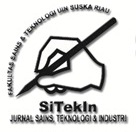The Implementation Of Halal Product Guarantee System For Self-Declare Halal Program In Frontier, Outermost and Least Developed Regions
Abstract
Full Text:
PDFReferences
Akim, A., Konety, N., Purnama, C. and Korina, L.C. (2019), “The Shifting of Halal Certification System in Indonesia: From Society-Centric To State-Centric”, MIMBAR : Jurnal Sosial Dan Pembangunan, Vol. 35 No. 1, pp. 115–126.
Ali, M. (2016), "The Concept of Halal Food in Sharia Perspective and Product Responsibility of Halal Industr", Ahkam: Jurnal Ilmu Syariah, Vol. 16 No. 2, pp. 291–306.
Daulay, A.R. (2020), "Strategic Assumptions for The Success of Coal Mining Reclamation to be A Tourism Site; A Case Study in Rantau Pandan Village of Bungo Regency", Jurnal Ilmu Lingkungan, Vol. 18 No. 2, pp. 253–260.
Faridah, H.D. (2019), "Halal certification in Indonesia; history, development, and implementation", Journal of Halal Product and Research, Vol. 2 No. 2, p. 68.
Mulizar, M. (2016), “Pengaruh Makanan dalam Kehidupan Manusia : Studi Terhadap Tafsir Al Azhar”, Jurnal At-Tibyan, Vol. 1 No. 1, pp. 118–142.
Nasrullah, A. (2019), “Marketing Performance Determinant of Halal Products in Indonesia”, HUNAFA: Jurnal Studia Islamika, Vol. 16 No. 1, pp. 111–141.
Rahmat, A. and Mirnawati, M. (2020), “AKSARA: Jurnal Ilmu Pendidikan Nonformal”, Jurnal Ilmu Pendidikan Nonformal, Vol. 06 No. 01, pp. 62–71.
Sari, M. (2022), "Halal Food Quality and The SDG-3 Goal", Halal Tourism and Pilgrimage, Vol. 2 No. 1, pp. 1–11.
Wiguna, G.G., Darkun, K. and Sulistyadi, K. (2020), “Sast & Ahp Method in Determining the Best Strategy of Office Ergonomics Program Improvement To Prevent Risk of Musculoskeletal Disorders At Xyz Company Qatar”, ADI Journal on Recent Innovation (AJRI), Vol. 2 No. 1, pp. 186–193.
Yakub, A. and Zein, F. (2022), "Halal Certification in Government and Non-Governmental Organizations: A Comparative Analysis of Indonesia, Malaysia, and Thailand", Jurnal Cita Hukum, Vol. 10 No. 1, pp. 153–176.
Zlatanovic, D. (2016), "Combining the methodologies of strategic assumptions surfacing and testing and organizational cybernetics in managing problem situations in enterprises", Ekonomski Horizonti, Vol. 18 No. 1, pp. 15–32.
DOI: http://dx.doi.org/10.24014/sitekin.v21i2.28628
Refbacks
- There are currently no refbacks.
Copyright (c) 2024 SITEKIN: Jurnal Sains, Teknologi dan Industri
 | Editorial Address: FAKULTAS SAINS DAN TEKNOLOGI UIN SULTAN SYARIF KASIM RIAU Kampus Raja Ali Haji Gedung Fakultas Sains & Teknologi UIN Suska Riau Jl.H.R.Soebrantas No.155 KM 18 Simpang Baru Panam, Pekanbaru 28293 © 2023 SITEKIN, ISSN 2407-0939 |
SITEKIN Journal Indexing:
Google Scholar | Garuda | Moraref | IndexCopernicus | SINTA

SITEKIN by http://ejournal.uin-suska.ac.id/index.php

.png)





